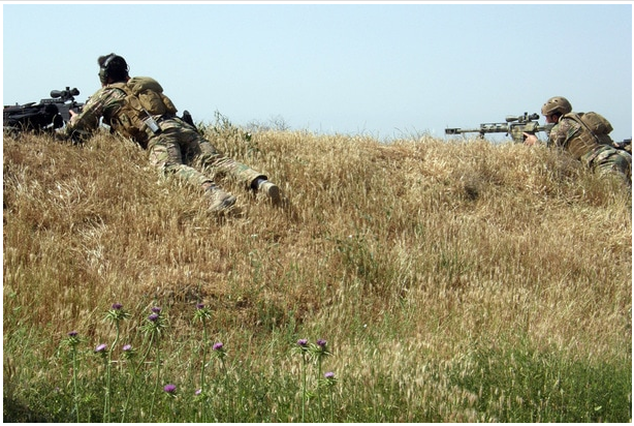The House measure, tucked into an early version of an annual defense bill, would require the Pentagon to set aside at least a quarter of up to $715 million in military assistance to Iraq for support to Kurdish peshmerga forces and Sunni tribal fighters.
The bill also proposes deeming the peshmerga and certain tribal fighters “a country” so they would be eligible to receive direct U.S. military aid against the Islamic State in the event that Iraq’s central government in Baghdad does not take steps to sufficiently empower them.
The government of Prime Minister Haider al-Abadi was particularly incensed by the use of the word “country,” which goes to the heart of the decades-long dispute over the degree of autonomy enjoyed by Iraq’s Kurdish region. Iraqi Kurds have gained significant political clout since 2003, but they continue to clash at times with Iraq’s central authorities and have threatened to hold a referendum on independence.
The House measure also drew criticism from Grand Ayatollah Ali Sistani, a widely revered Shiite cleric, and Moqtada al-Sadr, another powerful cleric whose Iranian-backed Mahdi Army militia fought fierce battles with American forces after the 2003 U.S.-led invasion. Sadr threatened to reactivate fighters under his command and attack American interests.
That would intensify the risks facing 3,000 U.S. troops now stationed across Iraq on a limited mission to train and advise Iraqi forces. Although the Mahdi Army was formally disbanded in 2008, Sadr controls several other militias, including the Peace Brigades.
“If the time comes and the proposed bill is passed, we will have no choice but to unfreeze the military wing that deals with the American entity so that it may start targeting American interests in Iraq and outside of Iraq when possible,” Sadr said, according to the Long War Journal, a Web site that tracks military issues.
A U.S. official, speaking on the condition of anonymity to discuss private discussions, said administration officials had reached out to lawmakers to make a case on what such a measure, if passed into law, “would mean for our interests in the region.”
Alistair Baskey, a White House spokesman, said the administration would work with Congress on language that would reflect its “support for a united, federal, and democratic Iraq and to helping the Iraqi security forces protect all of Iraq’s diverse communities from the threat posed by ISIL.” ISIL is among the abbreviations for the Islamic State.
“We’re working with Congress on language we could support,” the official said.
But the bill appears to have wide support among House lawmakers, many of whom argue that Iraq’s central government, led by the Shiite Dawa party, has failed to sufficiently arm Sunnis and Kurds who, backed by U.S. and allied airstrikes, are battling the Islamic State’s control over much of northern and western Iraq.
Kurds have complained that Baghdad hasn’t provided them with weapons earmarked for peshmerga fighters. Many Sunni Arabs, meanwhile, accuse the Shiite Abadi of dragging his feet in arming Sunni tribesmen and integrating them into the army.
The bill cleared its first legislative hurdle last week when the House Armed Services Committee voted to approve it in a 60-to-2 bipartisan vote.
Claude Chafin, a spokesman for the committee’s chairman, Rep. Mac Thornberry (R-Tex.), said the measure aimed only to facilitate assistance to Kurdish and Sunni fighters, and was not intended to assert anything about Iraqi sovereignty. Congressional officials say the measure would consider the Kurds and Sunni groups countries only for the purpose of meeting criteria to receive direct U.S. support.
Discussions about the bill take place as Massoud Barzani, president of Iraq’s semiautonomous Kurdistan region, makes a visit to Washington. The Kurdish leader, speaking after a series of White House meetings, said President Obama and Vice President Biden wanted “peshmergas to receive the right weapons and the right ammunition.”
But Barzani, in an appearance at a Washington think tank, stopped short of openly endorsing the proposed legislative language. “The important point here is the peshmergas get these weapons,” he said. “How they will come, in which way, that’s not as important as the fact that the peshmergas need these weapons.”
In a statement, the White House said that Biden and Barzani had discussed U.S. military aid “in full coordination with the Government of Iraq” during their meeting on Wednesday.
The Senate is not expected to include similar language in its version of the giant defense bill.
“We are confident that the bill will not go through,” said Lukman Faily, the Iraqi government’s ambassador in Washington.
U.S. officials reject the idea that Kurdish fighters have not received much weaponry. Under pressure from Washington, the Iraqi government has facilitated the delivery of some U.S. materiel, including mine-resistant vehicles and minesweepers, to the Kurds. They have also received arms from other nations supporting Iraq’s fight against the Islamic State.
But it is the safety of U.S. troops and the threat of renewed militant attacks that will be paramount to the Obama administration, which has sought to curtail U.S. involvement in conflicts in the Middle East.
Read More


 RSS Feed
RSS Feed